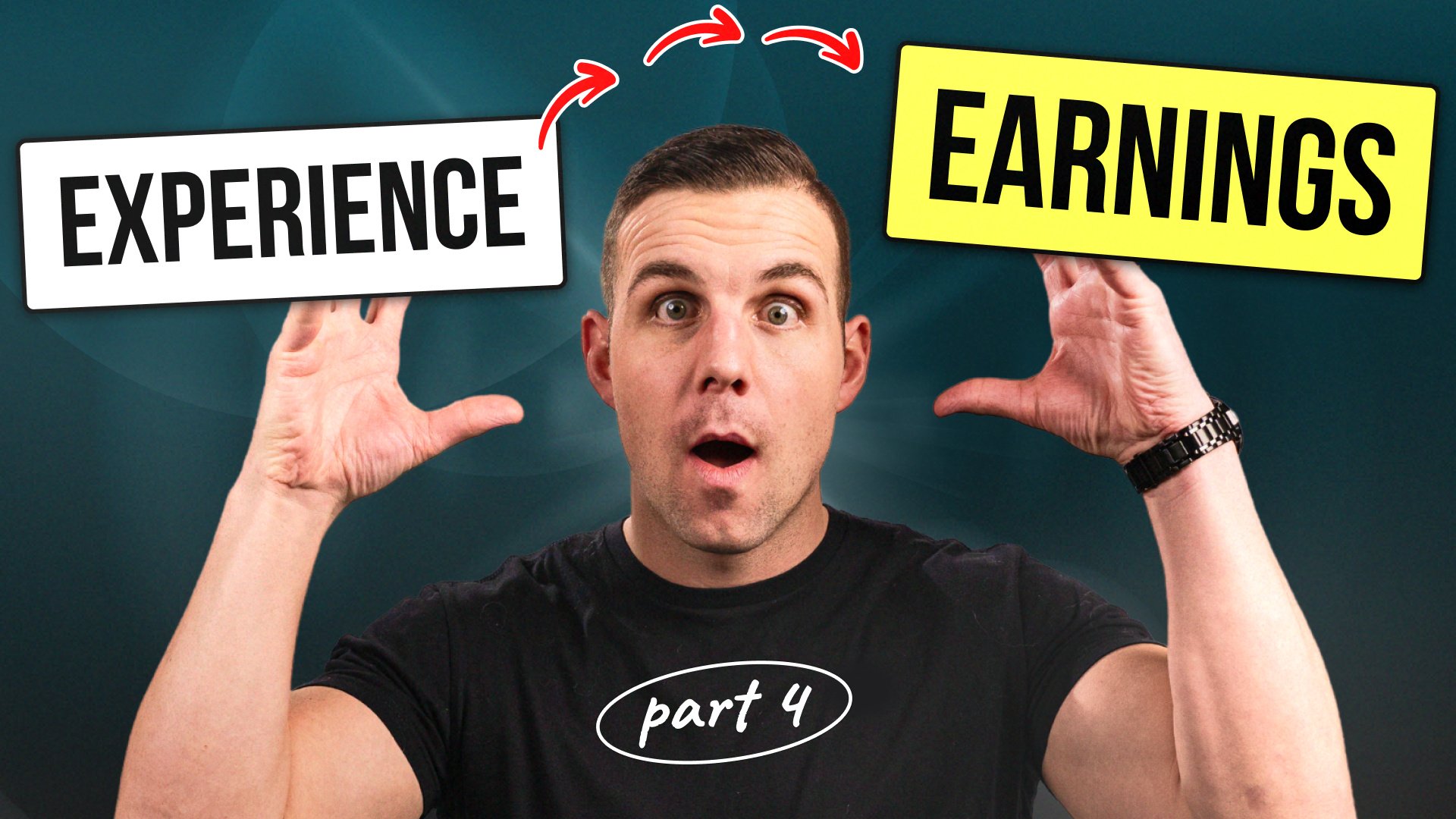5 Ways To Make Money Online With Your Knowledge – Part II
 Tyler Johnston
Tyler Johnston
Jun 18, 2024
How To Launch Profitable Online Courses
Watch The Video Here
In today's fast-paced digital world, hosting an online challenge is one of the quickest and easiest ways to turn your content and knowledge into cash. That's what we discussed in part one of this series. Today, we're continuing our exploration of the five best ways to make money online with your knowledge and expertise without needing a ton of capital or resources to get you started.
So, if you're ready to boost your impact and income with a business-building blueprint to get you there, let's jump right in.
What You'll Need To Get Started:
- Existing content (such as audio, video, PDFs, Facebook lives, Zoom recordings, etc.)
- An active Searchie account.
Leverage Your Expertise With An Online Course
Creating an online course allows you to maximize your earning potential by leveraging your know-how. This model lets you transition from the traditional one-to-one format to a one-to-many approach. By packaging your expertise into a course, you can reach a much wider audience without having to trade time for money continuously. That means more freedom, more impact, and ultimately, more income for you and your business.
The Benefits Of Building An Online Course
1. Scalability and Flexibility
Teach One-to-Many: An online course allows you to teach multiple people at once, significantly increasing your reach compared to one-on-one coaching. This means you can impact more lives without increasing your workload.
Global Audience: Online platforms enable you to reach a vast and diverse audience. This increases your potential income and allows you to impact more people with your knowledge. You’re not limited by geographical boundaries, meaning your potential market is much larger, and you can attract students from various backgrounds, enriching the learning experience and expanding your professional network.
Work On Your Own Terms: Creating an online course gives you the freedom to work when and where you want. You can create content at your own pace and manage your schedule without being tied down to specific coaching sessions.
Minimal Ongoing Time Commitment: Once your course is created, the bulk of the work is done. While you may need to update content occasionally, the ongoing time commitment is significantly less than live coaching or consulting.
2. Repeated Sales
Create Once, Sell Repeatedly: After putting in the initial effort to create your course, you can sell it over and over again without additional work. This allows you to generate income continuously from the same content.
Provide Consistent Value: Each student receives the same high-quality content, ensuring a consistent learning experience. This can enhance your reputation as a reliable and knowledgeable instructor.
Challenges Of Creating An Online Course
1. Upfront Time Investment
Significant Initial Effort: Creating a high-quality online course requires a fair amount of time and effort upfront. You’ll need to plan your curriculum, create content, and ensure everything is polished and professional.
Content Creation: Depending on your topic, you may need to create videos, write scripts, design presentations, and develop supplementary materials such as quizzes and workbooks.
Technical Setup: You’ll also need to familiarize yourself with the technical aspects of hosting an online course, such as setting up a website or learning platform, integrating payment systems, and ensuring a smooth user experience. Thankfully, you’ve got Searchie to take care of all this and more, so tech headaches are a thing of the past.
2. Variable Income
Fluctuating Sales: Your income from the course will depend on how many people purchase it each month. There may be fluctuations, with some months being more profitable than others.
Marketing Efforts: To maintain steady sales, you'll need to invest time and resources into marketing your course. This includes strategies such as social media promotion, email marketing, and possibly even paid advertising.
How To Create A Successful Online Course
1. Choose Your Niche, Topic, and Target Audience
Identify Your Expertise: Start by identifying what you are most knowledgeable about. This should be a topic you are passionate about and can speak on with authority.
Define Your Topic: Narrow down your expertise to a specific topic that you can teach in-depth. A well-defined topic helps to create a focused and comprehensive course.
Target Audience: Clearly define your target audience. Consider their demographics, interests, and pain points. The more specific you can be, the better you can tailor your content to meet their needs.
Example: Instead of targeting a broad audience like "people who want to lose weight," focus on "people preparing for their weddings who want to look and feel their best."
2. Structure Your Course Content
Develop Course And Lesson Outlines: Creating an effective course starts with outlining the topics and lessons you plan to cover. As the saying goes, “if you fail to plan, you plan to fail.”
Thankfully, if you’re having trouble coming up with an outline, AI tools like Chat GPT or CopyCreator are great resources you can use to quickly explain what niche and target audience your course is for. Let AI do the initial thinking to map out what topics and lessons would be great for your course.
Another great way to use AI during your planning process is to share your content outline and ask if there are any gaps or topics you might be missing that would benefit your target audience and your niche. Below is an example of what this process with Chat GPT might look like for a 10-day challenge teaching guitar, you can use these prompts as a guide with your own niche/topic to help design your challenge course outline:




Once you’ve got your outline, it’s time to move to the next step.
Create Engaging Materials: Develop engaging and varied course materials. Videos are particularly effective for engagement, but consider also using audio, written content, and interactive elements like quizzes and assignments to cater to your audience's wide range of learning styles and preferences.
3. Host Your Course On An Effective Platform
Choose the Right Platform: The last thing you want to do after coming up with your course idea and content is waste a ton more time trying to sort out tech issues. Having to learn how to create websites, host content, and all the little details that go into delivering the best experience for your audience can be a headache.
Sidestep this and select a platform like Searchie that takes care of all the guesswork for you. With searchable audio, video, and text-based content, personalized playlists, AI-powered tools to make your content accessible in a variety of formats, and integrations with user-friendly design tools like Canva, Searchie can enhance the learning experience and make your course more appealing to students while saving you time and money.
Utilize AI Features: AI has completely transformed the online information business landscape. You can and should leverage AI features to enhance your content creation, workflow efficiencies, and course engagement. The AI features of Searchie can help you personalize the learning experience, automate administrative tasks, and provide valuable insights into student progress.
Drive Traffic And Nurture Leads
To successfully market your course, consider these strategies:
Promote Within Your Content: Mention your course at the end of your podcasts, YouTube videos, or blog posts. This can help drive traffic from your existing audience, who already trust and value your content.
Social Media Promotion: Share your course on various social media platforms to reach a broader audience. Use engaging posts, stories, and even live sessions to generate interest and answer questions.
Email Marketing: Leverage your existing email list to introduce and sell your course. Craft compelling emails that highlight the benefits of your course and include a clear call to action.
Paid Advertising: Run targeted ads to attract potential students. Platforms like Facebook, Instagram, and Google Ads allow you to reach specific demographics that match your target audience.
Get Started Today
Building an online course is perfect if you have in-depth knowledge of a specific subject and want to teach and share it with a broad audience. It provides a scalable way to earn income and gives you back your time while reaching more people than traditional one-to-one instruction.
If you're ready to start building your online business with an online course, click the link below to sign up for a free Searchie account and start turning your content into cash. And if you want a more detailed step-by-step guide on creating an online course that sells, check out our video, where we walk you through the entire process from A to Z.
Yes, I want to get started.
Thanks for reading, see you in part three of this series!
For more helpful tips and tricks to transform your online biz, be sure to subscribe to our YouTube channel here!


